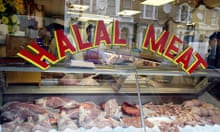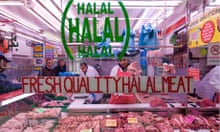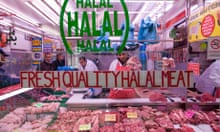Half-reluctantly, I should "come out", despite having hidden it from most of my fellow PhD students in the Cambridge English faculty. I try to avoid identity politics but for this article it seems necessary. I'm a white Muslim girl who doesn't wear hijab or speak Arabic. Unlike that other white Muslim, Jihad Jane, I quite like the west. In fact I'm inspired by western-educated Muslims such as Gai Eaton, who died recently. Nevertheless, the glib Islams that have plagued British Muslims to date exhaust me.
Nesrine Malik's article on "The rights and wrongs of halal", which has been vigorously commented upon by Guardian readers, fits the shoddy bill. Its purpose, like many articles on British Islam, is to dig a great gaping gulf between "religious" values and the "secular ethical ones" (anyone reminded of the Rushdie affair?) Malik scaremongers by providing inept source evidence for the British secular reaction against halal meat, and by providing no source evidence whatsoever on the Islamic concept of "halal".
Referring to a seven-year-old BBC news story that documents the Farm Animal Welfare Council's governmental advice to outlaw halal slaughter, Malik seems to be under the impression that the debate between the "British" and the "Muslims" rages on this issue. Yet if you go to the FAWC website and look through recent reports, the organisation seems fairly inactive with regard to halal slaughter, because, as is made explicit in a May 2009 report, many officially-certified halal slaughterhouses have adopted electric stunning as a mechanism for placating the animals.
And, if you then go to the guidelines stipulated in one of the UK's largest regulators of halal foods, the Halal Food Authority (HFA), you will see an unexpected middle ground. The HFA maintain that scientific methods should be "considered with caution" (not ruled out completely), that they must comply with the "Islamic ethos", and that multiple forms of stunning are in fact acceptable.
"Halal" is an Arabic term that, in Islamic contexts, means "lawful, permissible". Muslims are supposed to live their lives by this concept, with its connotations of cleanliness, integrity and self-restraint. That Malik ignores this definition, and goes on to omit the more specific relationship between "halal" and slaughter, is encapsulated in her impoverished description of why Muslims want halal meat at all: "the logic behind this is that remaining blood in the body may become polluted and harmful to humans".
Yet the Qur'anic justification for halal slaughter states that "forbidden to you is carrion, and blood, and the flesh of swine, and that over which any name other than God's has been invoked, and the animal that has been strangled, or beaten to death, or killed by a fall, or gored to death, or savaged by a beast of prey, save that which you [yourselves] may have slaughtered while it was still alive." (5:3). It's not about harmful blood, although this may be the rational interpretation of the opening lines. The deeper emphasis of this verse is on the "good" and "pure", as opposed to violent and careless. Pain is supposed to be minimised, the responsibility of the Muslim increased. Eating is an act of worship (ibadah).
I completely agree with Malik's emphasis on hypocrisy. I think it's something that we all suffer from with regard to personal ethics, and even more so concerning religious interpretation. The interpretations of the Qur'an and hadiths are a case in point, as Ziauddin Sardar beautifully demonstrates. For how can we explain a Qur'anic verse with certainty? And which practices are to be adapted for modernity? Certain rituals of seventh-century Islam have been codified and repeated, such as prayer, while others are often contextualised as activities for their time and place, which nonetheless are followed in spirit if not action.
Fortunately, Islam as a religion was founded on scepticism and antagonism – not blind acceptance. Unfortunately, if Muhammad's life was revolutionary, its aftermath has seen a monological recital of hadiths and inflexible analyses of Qur'anic verses, where historical context is taken up or ignored to suit the interpreter. Memories of early Islam have hardened into dogma, and many scholars have taken the hadiths as seriously as tablets of stone.
If diversity is feared, it is unavoidable when we are thinking through so-called "religious values". We must strive to recapture the multiple "spirits" of Islam instead. If we do, it will become immediately apparent that "halal" should stretch to every aspect of how we treat animals. Some halal butchers, such as Abraham Natural Produce, have rejected most Muslim slaughterhouses on this basis. No dead meat that has been factory-produced could be halal.
In contrast, if we make the Islamic spirit relevant to 21st-century British society, then we could argue that halal meat must be mass-produced in our late-capitalist times, especially if it is the only way of providing affordable meat to the relatively poor, mainly working-class African or South-Asian British Muslims in the UK. Modern-day "halal meat" could also mean that British practices that alleviate animal suffering are to be included in the definition.
Too much emphasis is wrongly placed, by Muslims and non-Muslims alike, on the ritualistic outward show of Islam. It's telling that more verbal and political energies are being channelled into anxiety about female head coverings, a tired debate recently rejuvenated in France, than about cruelty to animals or exploitation of the natural world.




